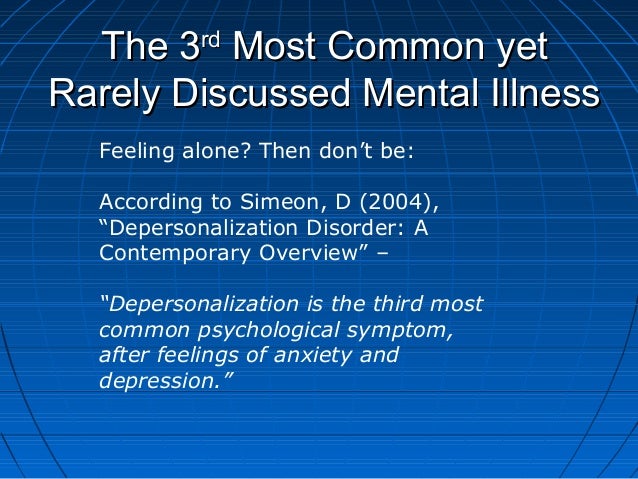
Eventually I spoke with a counselor, but she didn’t really seem to ‘get it’, and it didn’t help. I didn’t tell anyone for a long time because it sounded so strange, and I was sure people would think I was crazy.

I could still be a Mom to them, but I didn’t feel a proper connection.Īs I worried about more and more about this, I turned inwards and became quite depressed. I would have thoughts running through my head, like wondering whether I was really in control, and why I was the way I was. It was even worse at home as I would have times when I was with my children and it just felt so strange and unfamiliar – even when they were just acting like being with me was the most natural thing in the world. I could laugh and join in with other people, but it was purely intellectual – I didn’t feel anything, and I didn’t feel like it was ‘me’ joining in. It was difficult to cope at work, especially when I had to talk to people, and I struggled to cope in meetings. When it was bad, I would feel like I was going through the motions like a robot. I had other similar experiences after that, and times when I would feel distant became more frequent. My body felt weightless and far away, and my mind felt like it wasn’t inside my body, as if I had been separated from it.

Sounds got muffled and objects in the room looked flat: almost as if I was seeing things in black-and-white. One day, as I was about to leave work, everything started to feel distant and unreal. I worried about getting everything done, and I’d been putting in really long hours. It felt like I was being pulled in lots of different directions. I first noticed feelings of depersonalization and derealization after this long period where my work and home life had both been very stressful. Her story illustrates what it can feel like. Nora struggled with depersonalization and derealization. What is it like to experience depersonalization and derealization? This ‘not knowing’ is another part of what makes depersonalization and derealization so distressing. Sometimes, it’s less easy to make sense of what you’re experiencing and you may worry about what is real and what is not, or about what might be causing these symptoms. This makes depersonalization and derealization quite different from other experiences like hallucinations (seeing or hearing things that other people can’t see or hear) or delusions (believing things that other people don’t). They would say “it’s as if I’m not real anymore” rather than “I’m not real anymore”. People who have these experiences know that they are subjective, and will usually describe them in a way that shows this. Symptoms of depersonalization and derealization include:Ĭan you relate to any of these experiences? When they happen to you, you might not believe that you’re literally “watching yourself from behind glass” or “in a two-dimensional world” but they describe how you feel in the moment of depersonalization or derealization. Your senses of sight, sound, touch, and taste might also feel distorted. The world may look dreamlike and unfamiliar, or feel two-dimensional and less vivid. Your body may feel different, or it might feel as if you are dreaming.ĭerealization describes feelings of unreality and detachment from the world around you. You might feel like you are watching yourself from behind glass, or down a tunnel. But what happens when this experience is disrupted?ĭepersonalization describes feelings of unreality and detachment from your self, your emotions, thoughts, memories, or body sensations. Psychologists describe this as “the conscious experience of being present in the here and now”, the feeling of “being the agent of one’s own actions”, or “feeling embodied”. People generally have a coherent experience of a bodily ‘self’. What are depersonalization and derealization? Fortunately, cognitive behavioral therapy is a helpful treatment for depersonalization and derealization. It is thought that 1 or 2 people in every 100 will experience depersonalization-derealization disorder, and people often suffer with the symptoms for a long time before seeking help. If they become regular, more severe, and interfere with your ability to live your life, you may be suffering from depersonalization-derealization disorder. It’s normal to have brief experiences of depersonalization and derealization.

Feeling detached from the world around you is called derealization: the world seems unfamiliar or artificial. Feeling detached from yourself is called depersonalization: you might feel like you are dreaming, or watching yourself through glass. At some point in their lives (usually when they are tired or when their body or mind is under stress) most people have at least one experience of feeling detached from themselves, or from the world.


 0 kommentar(er)
0 kommentar(er)
